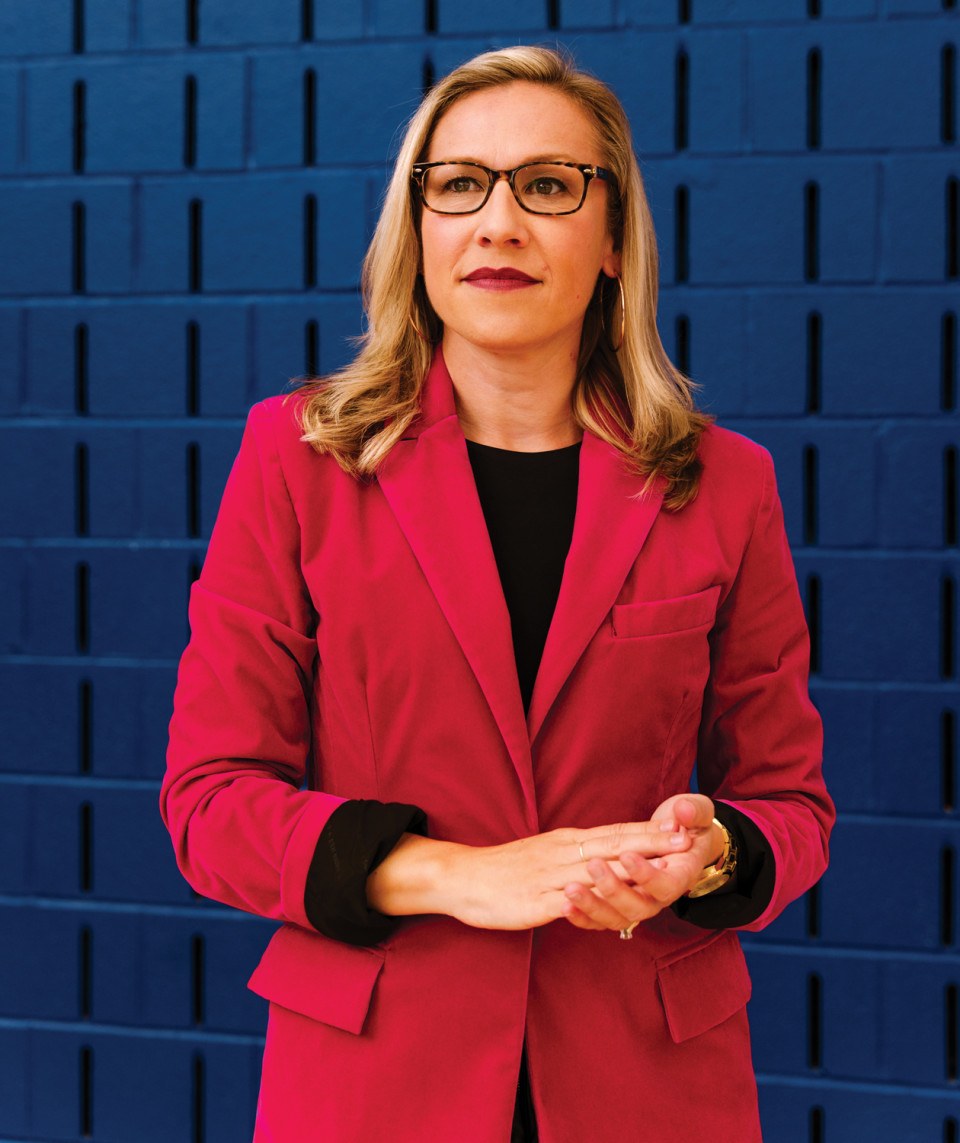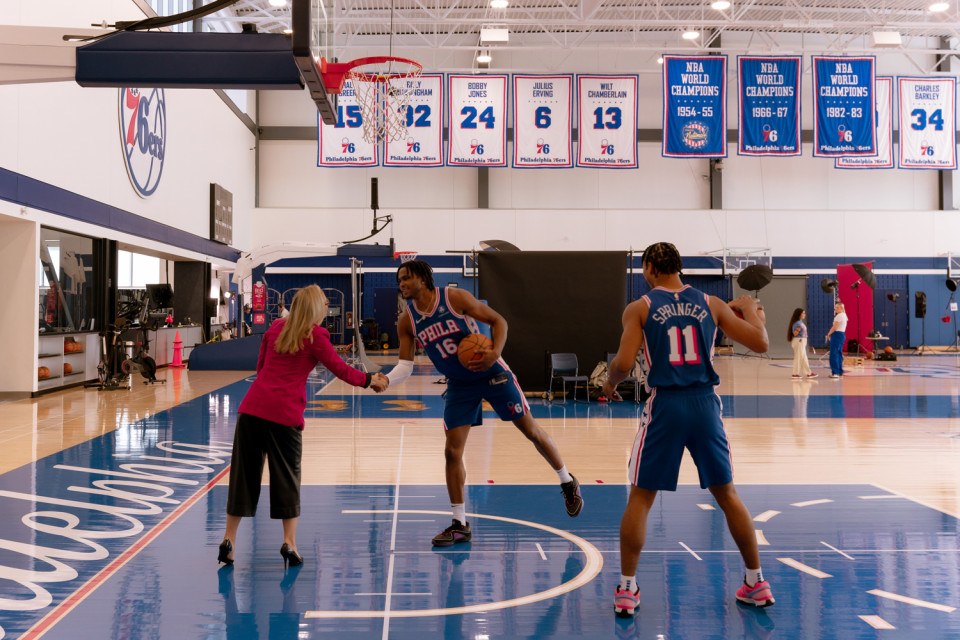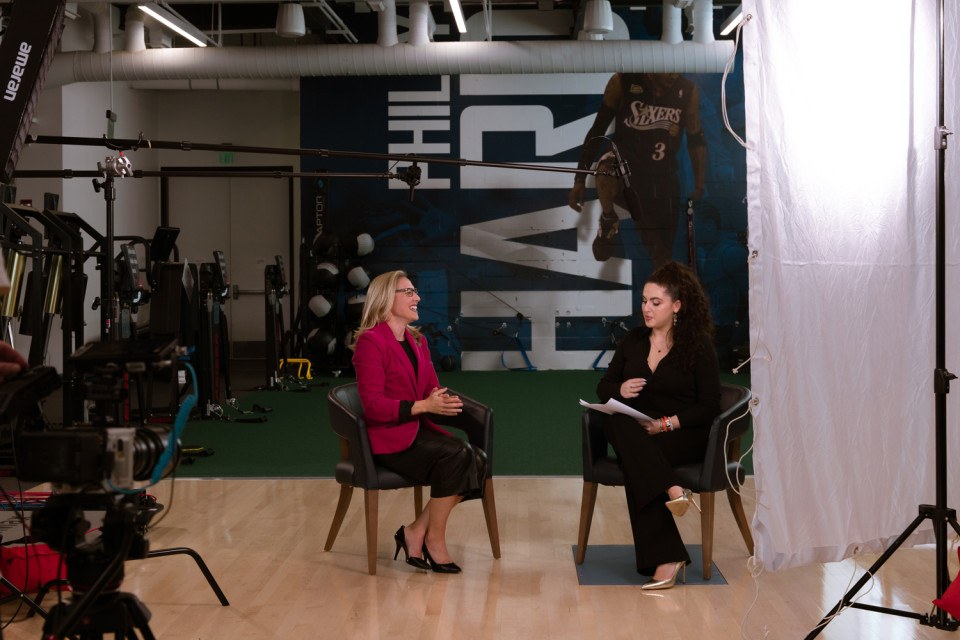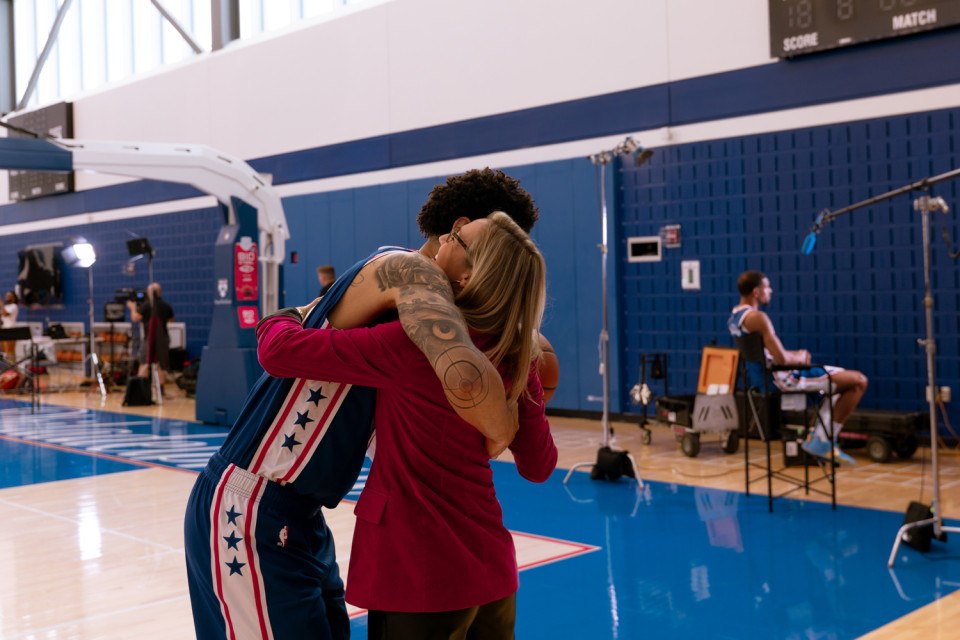How Kate Scott Went From Outsider to Groundbreaking Voice of the Sixers
“I’m a chick from a small town in the middle of California. I still have to pinch myself to realize that this is real.”

Kate Scott / Photography by Caroline Gutman
It’s a surprisingly hot morning in late September, and Kate Scott is sitting in front of an enormous mountain of scrap metal. The claws of excavators dangle overhead, scooping up piles of crumpled cars, rusty pipes, and discarded appliances. It was Kate’s idea to meet here instead of at the Wells Fargo Center, the way the NBCUniversal PR team had arranged. I think of her PR team as I watch a hulking pile of metal swing noisily above their rising-star sports broadcaster, the play-by-play announcer for the Sixers. They’d surely be freaking out. But Kate texted me last night, ripping through the red tape: Did I live in the suburbs, like her? Would meeting somewhere else be more convenient for me?
“Weird? Awesome? Can’t tell,” she’d texted, with a link to the Steel Penny, a cafe nestled alongside a junkyard in Hatboro, smack-center between our homes. Her texts brim with emojis and exclamation points, so when we first meet, next to hunks of aluminum glinting in the sun, it feels like I’m meeting a friend. When we grab a corner spot in the cafe (which is, in fact, awesome), the starstruck manager offers to lower the music for us. (“Can I get a picture with you before you leave?” she asks Kate shyly.) Kate smiles warmly, and suddenly, everything I’ve planned melts away.
My husband, a die-hard Philly sports fan, went over with me what I would say in this interview today. He gave me a crash course on basketball, on the Sixers, on who Kate Scott is and what she does. Under no circumstances, we agreed, would I tell her the truth about me. But Kate is so friendly and unintimidating that I feel like I can come clean.
“I have to tell you something,” I say. “I am the absolute worst person to be writing this story. I don’t know anything about sports.” I admit I didn’t know who she was before this assignment. I also didn’t know about Marc Zumoff, her legendary predecessor, who was the beloved television voice of the Sixers for 27 years before retiring in 2021. Other than Joel Embiid, who I’ve heard is pretty good, I couldn’t name one person on the team.
I finish my rambling confession. Kate tosses her head back with a hearty belly laugh. “YES!” she says gleefully. “I love this!”
If I’m the least likely person to be writing this story, Kate is perhaps the least likely person to be sitting across from me. “There’s absolutely no reason I should be here,” she says, a confession of her own. “I’m a chick from a small town in the middle of California. I still have to pinch myself to realize that this is real.”
Kate remembers when Zumoff retired and the letter he wrote to distraught fans: “If life is a basketball game, I’m into the fourth quarter. I will pass the baton on to the next television voice of the Philadelphia 76ers, doing so with peace of mind and a heart that couldn’t be more full.”
“I remember reading it and thinking: Whoever tries to replace him is a fucking idiot, because he is a legend in Philly,” Kate says. “Then the next day, I get a call from my agent: ‘Hey, we think you should apply for the Sixers gig.’ I was like, you guys are fucking crazy. There’s not a chance in hell that Philly and NBC are going to hire some gay chick from California.”
But they did, of course, and Kate is now in her third year with the organization, only the second woman to be hired as a full-time play-by-play announcer in NBA history. (Days before the Sixers announced Kate’s hiring, the Milwaukee Bucks brought on Lisa Byington to do their play-by-play.) Kate had racked up a list of firsts before this — first woman to call an NFL and an NBA game on the radio, first woman to call Olympic men’s basketball, first woman to call football for the PAC-12, part of the first all-women’s NHL broadcast crew. But it’s not just about scoring firsts. Kate has to win people over along the way. She has to prove to an industry long dominated by men that she belongs there.
And she’s had to prove to Philly — a city that eyes outsiders with apprehension at best and hostility at worst — that she belongs here.
“Kate!” Tyrese Maxey trots up to Kate Scott and wraps her in a hug. He has plenty of other people he needs to talk to — it’s Sixers media day, and the court at the team’s Camden practice facility is ringed with at least a dozen different interview and photo setups. Everyone wants face time with Maxey — Kate later tells me he’s one of the league’s brightest future all-stars — but he wants to hear from her first. He grabs a microphone and recording device that he uses for his weekly podcast, Maxey on the Mic, and starts talking.
“Okay, guys. We have the Kate Scott here. She’s big-time. It took me, like, 20 days to get this interview.” Again, Kate tosses her head back in laughter. Maxey asks her the same question he’s asked all his teammates: If you could have one superpower, what would it be? (Maxey and Paul Reed picked superspeed. Embiid and Patrick Beverley separately said they’d want to be invisible so they could rob banks, although when Maxey expressed his horror — “So you’d be a supervillain?!” — Embiid clarified that he’d give the money to people who need it in Africa.)

Kate Scott with the team on Sixers’ media day
Kate takes a different route. “Is healing the world too big of an ask? We’re too angry right now. We need more empathy, more compassion.”
She knows firsthand how angry people can be. She was expecting it when she took the job, allowing herself three years for the vitriol to die down. After all, she was changing the Sixers’ soundtrack after it had been the same for decades.
“I knew it wasn’t going to be easy for her,” Marc Zumoff tells me. “But I am amazed by the fortitude and resilience she’s had, because she’s had to deal with a lot. She faced misogyny to the point of personal hate from people who I think had an ax to grind that was probably far deeper than just a woman becoming the announcer for their favorite team.”
Kate was on Zumoff’s podcast, too, back in April. (Fittingly, she was his very first guest.) She explained how all of the firsts she’s racked up as a woman doggedly chiseling her way into a domain largely controlled by men had thickened her skin. You can hear this in the way she recited to Zumoff some of the messages she’s received, her voice steady and matter-of-fact: Hey, you cunt faggot bitch. Go back to California and be gay on the coast. What the fuck do you know about men’s basketball with your vagina?
But Kate is quick to note that this isn’t a distinctly Philly thing. These were the same sorts of tweets and direct messages she got when she called games for the 49ers in San Francisco, when she called the hockey game in Chicago, all the way back to when she was just starting out, a million jobs and lifetimes ago.
“There’s no ladder in sports journalism,” Kate tells me. “I like to tell kids it’s a giant oak tree with a zillion branches. And you just hope that you’re walking out on the right one.”
At 40, Kate has ventured onto plenty of branches, and they all appear on her résumé as a string of letters and numbers that at least to me reads like hieroglyphics: NFL, NBA, NHL, NCAA, FIFA, PAC-12, NWSL, USWNT, PHF, PWHPA, WCC, KNBR, KCBS. They’ve taken her to stadiums, studios, fields, rinks and courts all across the country, but every tree has roots, and Kate’s are in Clovis, the small town in central California where she grew up.
“It was pretty idyllic,” Kate says of her childhood. You didn’t lock your doors then, and the neighborhood kids played until the streetlights flickered on: baseball with the bases spray-painted on the street, roller hockey, basketball. (Kate’s was one of the few houses with a hoop.) Her parents — Mom was a special education teacher, and Dad worked in vehicle maintenance for their town — were only passing sports fans, and her older sister was more concerned with boys and makeup, so it was rather peculiar for the family to wake up on weekends and find Kate, at five years old, watching SportsCenter replays instead of Saturday-morning cartoons.
Despite not having any pro teams, Clovis wasn’t a bad place for a sports fanatic to grow up. Fresno State sprawls along the town’s border, and in 1995, it nabbed one of the hottest college basketball coaches in the country: Jerry Tarkanian, who, Kate patiently explains, is pretty famous.
“Fresno State was like the Phillies and the Sixers and the Eagles all wrapped up into one,” she says. “Sports were everything. I wanted to watch it. I wanted to listen to it. I wanted to play everything I could forever.”
Kate did play everything — tennis, basketball, track and field, soccer — and when she wasn’t playing, she was on the microphone, leading cheers at the Friday-night football games and working as the PA announcer for the men’s soccer team. Her plan was to go to college on a soccer scholarship and play for the U.S. women’s national team. She was a soccer player. She was an athlete.
Until she wasn’t.
During her junior year of high school, Kate hurt her knee — the sort of injury you can’t come back from. What, she wondered, would a life without playing sports look like? (I could have explained this to her.) At first, it looked like her high-school newspaper, where she began writing a sports column. Then life looked like UC Berkeley, where Kate joined the rally committee, a nerdy crew in charge of traditions like firing the victory cannon after touchdowns. She ran a student segment on the highlight show, and she became the first woman in school history to join the ranks of the “mic men,” a group of guys who led cheers at football games. (“Can I at least try?” she asked when told the group had always been men.)
“I haven’t thought about wanting to be the first or trying to break any ceilings,” she insists. “They were just cool-looking things that I wanted to do, and so I’ve asked if I could do them.” Still, it’s not always about what you ask, but how you answer. So when the producer of the Cal highlight show called Kate soon after she graduated in 2005 to see if she’d call some Bay Area high-school football games for him, she said yes.
Well, that’s not entirely true.
“I said, you’re fucking crazy. I’ve never called anything in my life. And he said, ‘Why don’t you come try? If you suck and you hate it, you never have to do it again. But maybe you’ll like it. Maybe you’ll be good at it.’”
Kate remembers the call that changed everything — the quarterback dropping back to throw a beautiful long ball, the receiver catching it smoothly, the touchdown.
“That one call right there lit my soul on fire the way playing sports did. I thought: This is what I want to do.” But thousands of people want to do this, too, so Kate spent five years working as a traffic reporter for Bay Area radio stations and calling high-school football games. Then in 2011, her first big break: KNBR, the radio flagship for the San Francisco Giants, 49ers and Warriors, hired her, the first woman to ever be the station’s full-time on-air voice.
If the sports-broadcasting industry is in fact a giant oak tree, a zillion branches sprouting wildly in all directions, Kate had begun her climb.
Even with oaks, branches snap off all the time. A little more than a year into her gig at the radio station, Kate was broadsided by a town car while riding her bike in San Francisco. She suffered a mild traumatic brain injury that left her unable to sit up or be in a room with noise or sunlight for weeks. She’d lost her quick wit, her focus, her sense of humor. How could she find her way in a job that required her to remember statistics, player names, numbers, the backstory of a team and the history of a sport, if she couldn’t even find herself?
Kate moved with her wife, Nicole, to her mother-in-law’s house in Sonoma and tried to piece herself back together, her life now a steady stream of doctor appointments: mental therapists, physical therapists, chiropractors. She went back to work two months later — too soon, she admits now — and slowly found her voice again. The industry she’d been terrified would forget her while she recovered started calling her with questions: Would she anchor Saturday-night sports for the local NBC affiliate? Would she be the sideline reporter for the Bay Area’s MLS team, the San Jose Earthquakes? What about Minor League Baseball’s San Jose Giants? Could she freelance for the PAC-12 network? (Yes, yes, yes, yes.) And then, in 2016, a bigger branch, a bigger break: Would Kate be interested in calling the 49ers pre-season games? Yes!
Well, again, that’s not entirely true. “I said, ‘You’ve gotta be fucking kidding me. You’re full of shit, right?’ It was terrifying. I thought, if I suck, I’m going to set our entire gender back 25 years.”

Kate Scott on Sixers’ media day
A handful of other women were calling national games at the time — Beth Mowins, Pam Ward — and many had blazed trails before her, like Suzyn Waldman, the longtime commentator for the Yankees who received used condoms in the mail when she started doing play-by-play in the mid-’90s. Things have gotten marginally better, but the stats are still pretty dismal. One recent study put the number of women sports broadcasters at 16.5 percent. Very few of these are play-by-play announcers; many women are still relegated to the sidelines and anchoring. (Even fewer are women of color.) So when someone extends you a branch, you hop on.
“I was consumed by sports,” says Kate. “I told myself: You’re always going to be questioned because you’re a woman. If you know everything about everything, then they may not like your voice, they may not like your face, but they’ve got to respect your knowledge.”
By 2017, Kate had left her radio job for the PAC-12 network. She’d been juggling both gigs for a year — working radio in the morning, then catnapping in her Prius and getting camera-ready in Target bathrooms before heading across town to call games. She’d made a name for herself on the West Coast, but the East Coast is the center of the sports-broadcasting universe, so she wrangled a meeting — 15 minutes! — with NBC Sports in Stamford, Connecticut.
“I’m hopeful that in the next few years, you’re going to start seeing my name, and I wanted you to know who I was,” Kate told the NBC executive who stood before her, as flabbergasted as anyone that she’d flown across the country for a handshake. The trip was worth it: A few months later, the network hired her to call women’s basketball for the Atlantic 10. Her first game? St. Joe’s.
“I didn’t realize it at the time, but looking back, it feels like the world was leading me to Philly,” says Kate.
But before the world could lead her anywhere, it shut down. Sports all but disappeared during COVID, and Kate lost her PAC-12 job. She went back to sports radio, that branch she’d been on so many years ago, until the gigs trickled in again: Could Kate call women’s hockey? What about Warriors games, international men’s soccer, basketball for the Tokyo Olympics, college football? Yes, yes, yes, yes. And finally, in 2021, her biggest break yet: Would she be the next voice of the 76ers?
The answer was obvious. “Why the hell wouldn’t I want to come to Philly? This city lives and breathes sports. That’s me.”
But getting the city to see itself in her was a tall order, and not simply because she’s a woman. “I think in some ways, it’s even harder for her to overcome the fact that she’s not from here. We tend to be pretty parochial,” says Zumoff, who hails from Northeast Philly. “It’s religion to us.”
Amy Fadool, who hosts the pre- and post-game shows for NBC Sports Philadelphia, saw a shift happen after Kate’s first season. “Philadelphia is a very passionate fan base,” she explains, “but also a very smart fan base. Most people do want to give people a chance here; they want them to succeed, they want to cheer for them. They wanted to cheer for Kate, but they weren’t sure if they had a reason to.”
Fadool knew they’d find a reason. She’d watched Kate call a game out West — “some PAC-12 team, and I’m thinking, this is great. I’m not even interested, but I’m invested now because she pulls you in. She’s not just here to tell you what’s happening. She’s here to invite you into the environment.”
I realize this as I trail Kate at media day. She’s in a berry pink blazer, a spark of unexpected color among all the blue Sixers uniforms. The players are drawn to her, running over to give her hugs, ask about her summer. (She whispers their names to me after they go.) It’s a full-circle moment for her; she arrived in Philly the day before media day two years ago — an outsider fresh off the plane, no place to live, her wife and dog back in California, tying up loose ends.

Kate Scott on Sixers’ media day
“It’s still COVID, and we’re not traveling with the Sixers, so I haven’t even been able to talk to these guys yet. I’m calling our road games off of monitors, everybody hates me because I’m not Marc, I get COVID at Christmas so I can’t call games, and I’m in an Airbnb by myself on the other side of the country,” Kate recalls. “I know I love a challenge, I know I want to be here, but maybe this is too much. Maybe Philly doesn’t actually want me.” After 15 years of making calls, maybe this time she’d made the wrong one.
Tyrese Maxey got COVID that December, too, and had to watch the games from home, which meant he got a front-row seat to the Kate Scott show. He wants to be a broadcaster one day, and Kate inspires him. He talked about it on a podcast with Lauren Rosen, the Sixers team reporter. Sometimes, he told Rosen, he would turn down the volume and try to do a Kate Scott impression.
“She’s normalizing having men look up to women in that role,” Rosen says. “There are young boys, young kids, who are having the experience with Kate that so many people had with Marc. Their memories of watching the Sixers are going to be associated with Kate Scott’s voice.”
Back at the Steel Penny, the manager has asked Kate if she’d mind meeting the chef before she leaves. There’s a delivery guy from a restaurant-supply company there, too, who wants to meet her. And a server who wants to snap a picture for her boyfriend, who’s a huge Kate Scott fan. Kate poses with her, with the manager, and then with me, the least likely person to be standing here with her.
This is what Kate loves about working in sports. She explained it to Zumoff during the podcast: “In my opinion, it is maybe the final frontier when it comes to being able to bring people together who would never interact in any other facet of their life.” This is especially true in Philly, a city divided into distinctly different neighborhoods but united by a fierce and unwavering love for our teams.
Finally, things become clear. It’s my job to bring people into Kate’s world, but it’s her job to bring me into hers.
A week after media day, the Sixers have their first pre-season game. I watch it on TV, and even though I don’t understand much of what’s happening, I feel a part of it. There’s Embiid, who could never be invisible. There’s Maxey, who wants to be like Kate when he grows up. There’s soft-spoken De’Anthony Melton, who told me the team is excited by Kate’s energy, by her fiery approach to the game, by how much she adores being around them. There’s Alaa Abdelnaby, Kate’s broadcast partner, who, when I ask him what he wants me to know about Kate, tells me that we can’t let her go, a prospect that looms large as Kate’s national profile continues to rise. Just this past summer, she called the Women’s World Cup and was hired to replace the Seattle Seahawks’ longtime pre-season commentator. How long before she’s asked to climb to a higher, bigger branch on this oak tree?
And there’s Kate, who has welcomed me into her world. It’s becoming my world, too. A few days after the pre-season game, I send her a video of my six-year-old scoring a goal in his soccer game. She texts back, and I can hear her voice behind it, brimming with the same unbridled excitement she has for the Sixers, that she’s had for a million games in her life, that she has, always, for all that sports means in our lives:
“LET’S GOOOOO!!”
Published as “Great Scott!” in the December 2023/January 2024 issue of Philadelphia magazine.


